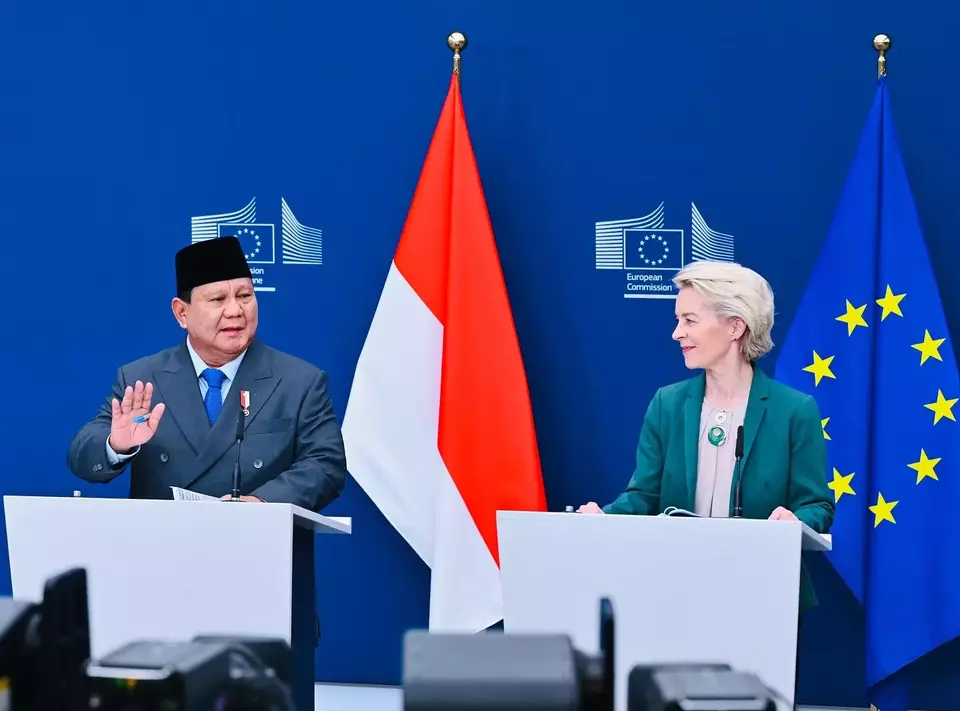Indonesia and the European Union have entered the final stages of concluding the Indonesia-European Union Comprehensive Economic Partnership Agreement (IEU-CEPA), a landmark trade pact that promises transformative benefits for both economies. The political milestone was marked by a ceremonial exchange of letters between Indonesia’s Coordinating Minister for Economic Affairs, Airlangga Hartarto, and the European Commissioner for Trade, Maroš Šefčovič, reaffirming their joint commitment to conclude the negotiations by September 2025.
Initiated in 2016, the IEU-CEPA negotiations have spanned ten years, encompassing 19 formal negotiation rounds and multiple intersessional meetings. This recent political exchange emphasizes a consensus on resolving remaining substantive issues and advancing the agreement toward signature. In a bilateral meeting held in Brussels, President Prabowo Subianto and European Commission President Ursula von der Leyen jointly announced the progress, describing it as a “strategic breakthrough”.
President Prabowo commended the negotiating teams, stating, “There are no longer major issues dividing the European Union and Indonesia, which is extraordinary.” President von der Leyen echoed this sentiment, emphasizing that the agreement will not only strengthen bilateral trade but also secure critical raw material supply chains vital to Europe’s clean technology and steel industries.
At the core of the IEU-CEPA is the promise of substantial tariff liberalization. Upon implementation, the agreement will eliminate tariffs on approximately 80% of goods, providing a major boost for Indonesian exports. According to Fithra Faisal, Senior Expert at the Presidential Communication Office (PCO), the deal could increase Indonesia’s exports by up to 50% within the next three to four years.
Among the key beneficiaries are Indonesia’s flagship products such as sustainable palm oil, textiles, footwear, fisheries, processed foods, and agricultural commodities. Notably, the agreement secures zero-percent tariffs for crude palm oil (CPO) and palm kernel oil (PKO), with a quota of 1 million tons per year.
Beyond trade, the IEU-CEPA is expected to stimulate broad-based economic growth. Projections indicate an increase in Indonesia’s welfare by USD 824.56 million and European welfare by USD 481.19 million. The agreement is also forecasted to increaseIndonesian investment by 0.42%, strengthening investor confidence in a more open and stable economic environment.
An important spillover effect of increased trade and investment is job creation. It is projected that up to 1 million new jobs could be generated across manufacturing, agriculture, fisheries, professional services, and logistics, offering a much-needed lift for employment and income levels.
The IEU-CEPA is also positioned as a catalyst for Indonesia’s green economic transition. By attracting investment into renewable energy, sustainable agriculture, and green industries, the agreement aligns with Indonesia’s broader agenda to become a low-carbon economy. The high standards embedded in the agreement are expected to encourage technology transfers and the upgrading of domestic production processes, thereby increasing national competitiveness.
Strategically, the agreement enables Indonesia to strengthen its market position in the EU, which is currently Indonesia’s fifth-largest trading partner. Conversely, Indonesia ranks 33rd among the EU’s trade partners, a gap that IEU-CEPA aims to close by opening access to underutilized European markets.
By facilitating regulatory alignment and market penetration, IEU-CEPA serves as a gateway for Indonesia to become a more influential actor in the global economy. As the final legal and technical documentation is targeted for completion by September 2025, both parties have reaffirmed their commitment to ensure a mutually beneficial, balanced, and forward-looking agreement. IEU-CEPA is set to become a model of modern, inclusive, and sustainable economic diplomacy, marking a new chapter in Indonesia-EU relations.




